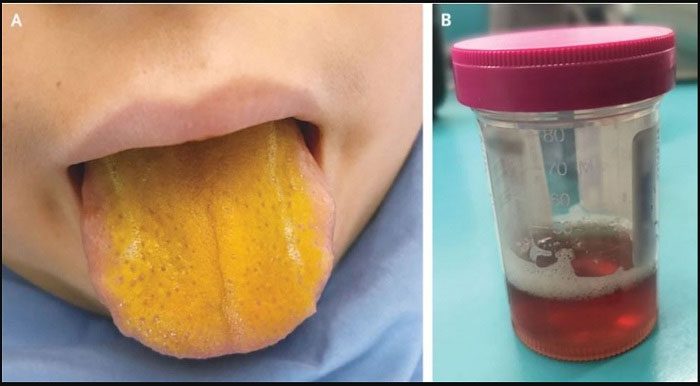Recently, a 12-year-old boy exhibited signs of a serious and extremely rare disorder characterized by a yellowing of the tongue, dark urine, persistent sore throat, and continuous abdominal pain.
The report on the boy’s condition was published on July 24 in the New England Journal of Medicine, noting that his family quickly took him to the hospital after observing symptoms such as abdominal pain, sore throat, a yellow tongue, and dark brown urine. Additionally, the boy appeared pale and was in a state of weakness.
Doctors at Toronto Children’s Hospital diagnosed the boy with jaundice, a condition that causes yellowing of the skin and eyes as well as changes in urine color. In addition to the yellowing of the whites of his eyes, his tongue was also bright yellow like turmeric. This is an exceptionally rare case of jaundice in humans. According to the National Institutes of Health (NIH), jaundice occurs when a yellow chemical called bilirubin accumulates excessively in the body. Bilirubin is formed during the breakdown of red blood cells. So, what caused the boy’s jaundice?

The rare disease causing the boy to have a yellow tongue, dark urine, sore throat, and continuous abdominal pain.
After conducting several tests, the doctors identified a particularly rare chain reaction that led to the jaundice, yellow tongue, and dark urine in the boy. The cause could be attributed to anemia or a low red blood cell count. Additionally, the boy was infected with the Epstein-Barr virus, a common virus often encountered in children. Blood tests showed the presence of a specific antibody in his body that could cause red blood cells to break down prematurely.
Ultimately, the boy was diagnosed with cold agglutinin disease, a rare autoimmune disorder in which the immune system attacks and destroys red blood cells. This autoimmune disease is triggered by exposure to cold temperatures ranging from 32 to 50 degrees Fahrenheit (0 to 10 degrees Celsius) and can worsen during the winter months.
This condition leads to anemia and causes jaundice due to the rapid breakdown of red blood cells, resulting in the accumulation of bilirubin. In some cases, cold agglutinin disease can be caused by infections, including Epstein-Barr virus infection. In the boy’s case, doctors suspected the Epstein-Barr virus was the primary cause of his condition.
The boy received a blood transfusion and was treated with oral steroids for seven weeks to regulate his immune system activity. After being discharged from the hospital, he quickly recovered, and the color of his tongue gradually returned to normal.



















































